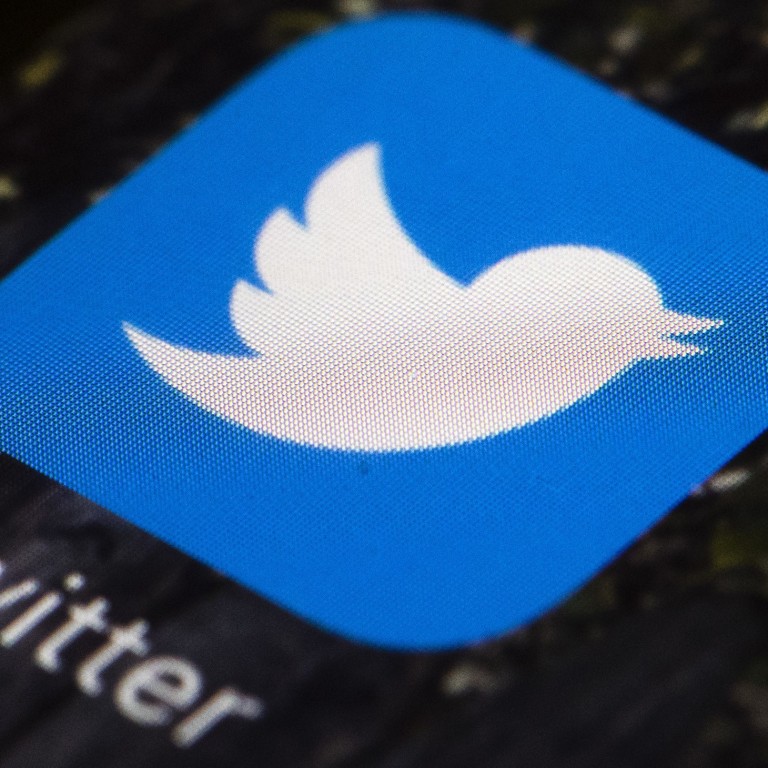
The ‘spammy network’ of Chinese Twitter accounts meant to ‘sow discord in Hong Kong’
- Two of the suspended accounts promoted themselves as news sources
- US company also says it won’t take advertising money from state media
Twitter said on Monday that it would no longer take advertising dollars from state-controlled media, a move that would target paid campaigns by Chinese state outlets as they ramp up the rhetoric against protests in Hong Kong.
“This policy will apply to news media entities that are either financially or editorially controlled by the state,” it said. “Any affected accounts will be free to continue to use Twitter to engage in public conversation, just not our advertising products.”
The announcement came as the US company suspended 936 accounts originating in China for “deliberately and specifically attempting to sow political discord in Hong Kong” as part of a “coordinated state-backed campaign” to undermine the city’s pro-democracy movement.
The accounts – part of a “larger, spammy network” of around 200,000 now-suspended accounts – were pulled offline as Hong Kong enters its 11th week of anti-government protests, triggered by an extradition bill that has been shelved but not withdrawn.
Facebook takes down anti-Hong Kong protest accounts ‘because of Chinese government links, not content’
At least two of the hundreds of accounts suspended by Twitter marketed themselves as news sources – the Twitter user @ctcc507 posted anti-protest and pro-police content to nearly 15,000 followers under the name “Dream News”, and a similarly aligned user @HKpoliticalnew used the Chinese name “HK Political Witness” to share content to some 22,500 followers. These accounts were amplified by other users originating from mainland China that have since been suspended.
Among these 936 accounts, 59 per cent of them had fewer than 1,000 followers, and 10.7 per cent had no followers. Some 20 per cent of them self-reported as being from the United States, and 66.7 per cent set their account language to Chinese. Some 44.5 per cent of the accounts were set up in 2017, while 8 per cent date back to 2009 and another 8 per cent to 2016.

Also on Monday, Facebook, acting on a tip-off from Twitter, removed five accounts, seven pages, and three groups on its platform, including the Facebook page for “HK Political Witness”.
These suspended accounts, deemed to be disseminating fake news and disinformation, were linked to individuals associated with the Chinese government, according to Facebook.
Francis Fong Po-kiu, honorary president of the Hong Kong Information Technology Federation, said the two companies were trying to restore order on their platforms.
“Both Twitter and Facebook are trying to eradicate fake news, which is why they have banned accounts pretending to be news outlets,” he said.
Lokman Tsui, a specialist in media and technology policy at the Chinese University of Hong Kong, said clues such as garbled user bios and revived long-dormant accounts could help tell whether users were genuine.
“There are obvious cases, but we also need to be careful that you don’t end up deleting actual accounts of people who just have wrong beliefs – that’s a freedom of speech issue,” he said.
Twitter’s ban on state media adverts takes aim at well-established state-media accounts, like broadcaster CCTV’s international arm CGTN and state news agency Xinhua. The affected accounts would be given a 30-day grace period to withdraw ads, the company said.
Chinese state media have paid for advertising on Twitter to promote content to overseas audiences, including condemnations of Hong Kong’s pro-democracy protest movement and rebuttals against accusations of mass incarceration of Uygurs in Xinjiang. A report detailing the posts related to Xinjiang was publishedin the US-based online publication The Intercept on Tuesday.
Twitter and Facebook suspend accounts for being part of China-backed campaign to disrupt Hong Kong protests
In the past week, CGTN America had 56 paid promotions, including six on Hong Kong. Content included videos labelling protesters as “rioters”, highlighting attacks on police and a Global Times reporter.
Xinhua also promoted paid content on protests in Hong Kong, with a number already removed on Tuesday for including “content that violated Twitter Ads Policies”.
Promoted content is marked and can appear in users’ feeds even if they do not follow the account.
David Bandurski, co-director of the China Media Project at the University of Hong Kong, said state outlets should not be banned outright, but state actors like China should be blocked from spreading paid propaganda or engaging in coordinated campaigns in an attempt to “misdirect the conversation on issues like Hong Kong”.
“If these outlets wish to compete fairly and openly for audiences, they should be welcome to do so, and we should trust our open societies to act on our values and expose lies and disinformation,” he said.
A 26-year-old male protester, who refused to be named, said the bans came too late and would have little effect on people’s beliefs.
“Everyone has already established the way they use social media and filter information,” he said. “They form positions before they receiving any information.”
But Yik Chan Chin, an assistant professor specialising in media policy at Xian Jiaotong-Liverpool University, said the move assumed all state media disseminated fake news.
“Just because they are state media, you assume that they are disseminating misleading information or fake news,” she said. “What’s the point of banning them? It’s just to make a political gesture.”
Additional reporting by Kinling Lo



